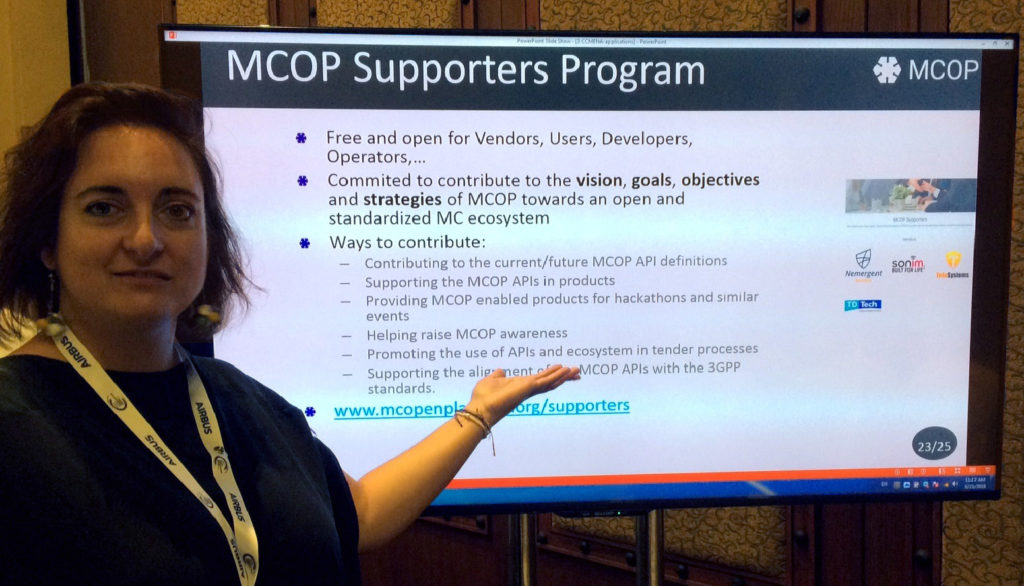MCOP project launches Supporter Program to harness industry enthusiasm
First workshop for user equipment vendors planned for November
September 24 2018: The halfway point in the first phase of the Mission Critical Open Platform (MCOP) project has been marked by the launch of an official Supporter Program to harness the enormous amount of interest that the initiative is creating.
MCOP is designed to catalyse the creation of standards-based mission critical MCPTT applications, removing the entry barriers of the multiple technologies and proprietary platforms usually involved. MCOP will ensure interoperability and help to encourage more players to enter the MCPTT market by making the business case more attractive. All MCOP components are fully compliant with 3GPP standards.
The advances made by MCOP, and its demonstrations given around the world, have generated a great deal of industry and user enthusiasm for the project. To join the Supporter Program, qualifying organisations will be expected to commit to the principle of using open standards if they wish to formally support MCOP activities.
MCOP Supporters may contribute to MCOP in a number of ways, including:
· Contributing to the current/future MCOP API definitions
· Supporting the MCOP APIs in products
· Providing MCOP enabled products for hackathons and similar events
· Helping to raise MCOP awareness
· Promoting the use of open APIs and ecosystem in tender processes
· Supporting the alignment of the MCOP APIs with the 3GPP standards
“MCOP is committed to open and standardised mission critical applications – we are delighted by the level of support for our work from the industry and are creating the Supporter Program to acknowledge this,” said Fidel Liberal, MCOP project coordinator. “MCOP Supporters have to commit to the vision, goals, objectives and strategies of MCOP. We hope this will give even greater strength to the project, and to open standards generally in critical communications, and grow the community as we move into the next phase.”

Dr Bego Blanco, Lecturer and Researcher at the University of the Basque Country, which leads MCOP, presenting the new Supporter Program at the Critical Communications Middle East and Africa event this week in Dubai
Earlier this year, MCOP announced the release of the first version of the Open Source MCPTT SDK, including the source code for a sample MCPTT application, which is available from the MCOP repository. Both the app and the SDK can be remotely tested in a full 3GPP MCPTT system using the MCOP online Testing platform or a live LTE+IMS+eMBMS testbed hosted in the NIST/PSCR labs in Boulder, Colorado.
The first MCOP workshop for user equipment (UE) vendors is planned for November, to explain and help UE vendors how to implement the MCOP APIs on their devices. The workshop will cover technical aspects, licensing issues and the benefits to vendors for their application and customer base.
For further information about the Supporter Program and the workshop, please contact info@mcopenplatform.org.
About MCOP
The MCOP project, funded by the U.S. Department of Commerce’s National Institute of Standards and Technology (NIST), aims to meet the challenges of the emerging and complex MCPTT ecosystem. The project, set to complete by mid-2019, will define, develop and validate an MCPTT client open platform that identifies neat open interfaces between the different technologies and reduces the integration efforts as well as delivering an online testbed for the applications. MCOP is led by the University of the Basque Country with partners Bittium, Expway and TCCA, supported by Nemergent.
For further information please visit www.mcopenplatform.org
Follow us @mcopenplatform
Über IP zum Breitband
Über IP zum Breitband (pdf) article (in German) on NET magazine.
First release of the Mission Critical Open Platform (MCOP) source code for MCPTT apps and software development kit
29 June 2018 - College Station, Texas, USA: The first versions of the Mission Critical Push to Talk (MCPTT) Open Source software development kit (SDK) and sample MCPTT app have been released by the Mission Critical Open Platform (MCOP) project, during the second ETSI MCPTT Plugtests ongoing this week in Texas. The entire source code is available to download from the MCOP repository.
The MCOP SDK and sample MCPTT app facilitate the development of mission critical services by handling most of the complexity of MCPTT application development. The SDK implements all the protocols and signaling specified in 3GPP Release 13/14 MCPTT standards while providing neat APIS for both APP developers and UE vendors, the so called MCOP Unified Open API- MUOAPI, and Integration API, publicly available under resources section.
The MCOP project is designed to remove the entry barriers of multiple technologies and proprietary platforms. It ensures interoperability, and provides a catalyst for more players to enter the MCPTT market by making the business case more attractive. All MCOP components are fully compliant with 3GPP standards.
Released with the MCOP SDK, the sample MCPTT app serves as a simple proof of concept of what can be achieved in a few lines of code using the MCOP SDK. Both the app and the SDK can be remotely tested in a full 3GPP MCPTT system using the MCOP Testing platform.
Additionally, a SIM-authentication emulation plugin following the MCOP architecture is provided for those developers that have no access to a MCOP Integration API supporting device.
Fidel Liberal, MCOP project coordinator said “We are really excited to release this version of the MCOP SDK to the community. It will allow us to validate MCOP architecture and check it is proven to be useful for different stakeholders including user equipment vendors, apps and SDK developers, researchers and new mission critical communications practitioners.”
About MCOP
The MCOP project, funded by the U.S. Department of Commerce’s National Institute of Standards and Technology (NIST), aims to meet the challenges of the emerging and complex MCPTT ecosystem. The project, set to complete by mid-2019, will define, develop and validate an MCPTT client open platform that identifies neat open interfaces between the different technologies and reduce the integration efforts as well as a live and an online testbed for the applications. MCOP is led by the University of the Basque Country with partners Bittium, Expway and TCCA, supported by Nemergent.
For further information please contact editor@tcca.info + 44 77 66 33 32 77
Towards Open MCPTT Ecosystems: The MCOP Approach - CCW18
The MCOP project was part of the conferences that took place during the Critical Communication World in Berlin last week.

